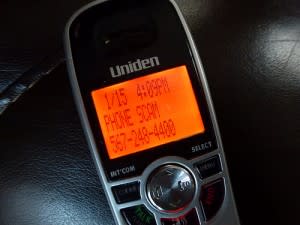The Nigerian Prince and Other Scams to Avoid
It doesn’t matter whether you’re a working-class citizen or a famous multi-millionaire – anyone can fall victim to a scam. Even Hollywood elites such as Steven Spielberg, John Malkovich, and Jeffrey Katzenberg weren’t immune to being duped by a scam artist who “Madoff” with millions of their dollars. So before you impulsively authorize an electronic funds transfer (EFT), use a credit card, or sign a remittance form – ask yourself “is this legitimate or is it BS?”
Here are several scams to avoid:
The Nigerian Prince
Indeed Keanu….
Most of us have had a good laugh reading emails from people claiming to be African (not limited to Nigerians) barristers, bankers, long lost relatives, relatives of famous political figures, government officials, businessmen, soldiers, political dissidents, and even princes! They’re easy to spot because their stories are as ridiculous as a Michael Bay plotline. But people still fall victim to these scam emails, and many were conned out of their life savings.
Here are several versions of the “Nigerian Prince” scam:
Pulling at your heart strings: The con man uses a real news story of someone’s death, claiming it was a relative. He then gives a sob story about needing your help to move his dead relative’s millions out of the country to avoid greedy family members/government. The scam artist then asks you to wire a “small amount” (several thousand) to cover expenses legal expenses and fees, promising you a share afterwards for your “generosity.”
You’ve got a long lost relative: A Nigerian barrister breaks the news that you’ve got a long lost relative in Africa, who died, leaving behind millions. Appealing to your greedy side, the barrister asks you to wire thousands to cover estate taxes and fees so you can claim your dead relative’s cash.
An offer you can’t refuse: The representative of a prominent political figure or Nigerian prince needs to transfer money out of the country and only you can help… with your bank account. First, they’ll send a large check to deposit into your account, then you’ll wire the money minus your “thank you” fee. Unfortunately, they forgot to mention the check is a fake, and once the bank finds out, they’ll reverse the transaction – leaving you in debt.
You’re the chosen one: A wealthy philanthropist on his deathbed who conveniently left no heirs has finally found someone worthy of his vast fortune (you know where I’m going with this right?). So after deeming you his successor, he needs you to wire over some money first… to you know, pay estate taxes and legal fees to transfer his riches to you.
Soldier of fortune: One of the more creative works of utter nonsense, the con artist claims to be soldier from a recent conflict (Iraq, Afghanistan, Bosnia) who stumbled upon the fortune of some dictator/warlord and hid the stash. Of course, he needs you to wire money to finance his expedition to retrieve it, promising you a share of the loot once he finds it.
Online dating scams: This one involves con artists creating accounts on dating websites, putting on the charm, and then asking you to wire them money because they’ve got 5 kids to feed, family in the hospital, or any number of hard luck stories. Or they may even ask you to re-ship items for them to strange locations (Africa, Russia, etc.) that are actually purchased with stolen credit cards.
While there are hundreds of examples of the “Nigerian Prince” scam to list, here’s a link to many real-life scam emails compiled from “scam-baiters,” who hilariously use the con artists’ games against them.
What You Can Do
If you receive emails asking for money, personal information, or bank details with the promise of easy money, just delete it. If you receive “official-looking” emails from the government or your bank that look like Nigerian Prince-type emails asking for your bank account details or money, don’t send anything!
Contact the government office or bank directly and ask them about the email – they’ll probably tell you that they’d never send such an email to begin with. Then email consumers@mas.gov.sg about the incident so they can take action on the matter. Remember, your greatest protection is following the maxim “if it sounds too good to be true, it probably is.”
Telephone Scams
Ah, if only it was that easy!
The “cold call” from the smooth-talking stranger who promises everything from amazing products and lottery winnings to “guaranteed” loans is another con to watch out for. What makes telephone con men so dangerous is that unlike the “Nigerian Prince” charlatans, who are hyena-like opportunists, these guys are sharks who’ll pressure you to say “yes” to whatever they’re offering.
Here are some common telephone scams to look out for:
You just won the lottery: You’ll receive a call from someone congratulating you on winning the lottery, usually some “foreign” lottery you’ve never heard of. But to claim your winnings, you must first pay heavy “taxes and fees” (by wire or remittance) to collect your winnings. Another version involves being conned into buying foreign lottery tickets with the promise of “favorable odds.” Then you’ll either be mailed fake lottery tickets or nothing at all.
We’ve got an investment opportunity for you: Would you invest in a company if the risk was low and you were guaranteed high returns? Answering “yes” to that question is what con men are counting on. When a con artist calls, he’ll use a sales pitch that answers every fear you ever had about investing. You might even be directed to a website or some press releases that make the investment look legitimate. Then the high-pressure tactics come out and you’re asked to invest thousands immediately before shares run out, only to find out later the company was about as real as Santa Claus.
Congratulations, you won (insert prize here): This scam involves a con artist calling to congratulate you on winning any number of prizes including free vacation packages, prize money, and home appliances. The only catch is that you’ll need to pay some administrative fees, taxes, and shipping costs before you can collect your prize. Unfortunately, the odds of actually receiving your “free” prize are about as good as having a wealthy long lost relative in Africa.
Donate to an unworthy cause: Nowadays, there’s a charity for about every cause, natural disaster, and disease known to man, making it harder to tell which ones are legitimate. This is the perfect cover for scam artists looking to exploit your generosity with high-pressure sales tactics meant to bludgeon you into donating as rapidly as possible. Con men may even claim to be from a real charity and ask for “donations” through the telephone via EFT or ask you to wire money. But the reality is that you’re only donating to the con man retirement fund.
Lend me your ear for a minute: When you have bad credit (or no credit), taking out a loan is like trying to land a date with a supermodel – there’s plenty of rejection. So when a random lender calls offering you a hassle-free, guaranteed loan, it sounds like the answer to your prayers. That is until the con man asks you to pay him a fee for loan “processing” and a “security deposit” (does anyone else see the irony here?). Once you pay, you can expect to receive your loan in exactly… never.
What You Can Do
The Personal Data Protection Commission (PDPC) will create a Do Not Call registry (DNC) on 2 January 2014. This will restrict telemarketers from calling you, preventing many of the aforementioned scams. According to the PDPC, DNC enrollment will be free and available at a future date. Until you get signed up, here’s what you can do:
Prize/Investment calls: If you receive calls from people asking for payment (credit card, EFT, remittance) to cover processing fees, taxes, and shipping so you can claim your free “prize,” hang up. Same goes for any “investment opportunity” that features the unbelievable BS terms such as: low/no risk, guaranteed returns, high returns, and 1000% returns, etc.
Charity calls: Hang up on anyone claiming to be from a charity that refuses to tell you about the charity’s history (founding, mission, what donations are used for). If you don’t recognize the charity, check the government’s Charity Portal to ensure it’s a registered charity. If you receive a call from a known charity, do not provide your bank details or pay over the phone. Instead, donate directly through the charity’s website/physical location.
Loan calls: When receiving calls from lenders offering “instantly approved” or “guaranteed” loans, hang up if they ask you to wire/post/EFT a processing fee and security deposit. Legitimate lenders include processing fees into the loan and never ask for a security deposit. Even if the offer sounds real, you should check the Insolvency & Public Trustee’s Office list of licensed moneylenders. Alternately, you can visit Smartloans.sg to see and compare and select home, refinance, commercial, and personal loans that are scam-free!
Ponzi Schemes
Bernie Madoff tested and approved!
With Ponzi schemes, the con is that your money isn’t actually being grown through “investment,” because it’s not being invested at all. Instead, the returns you see actually come from others who buy into the same scheme as subsequent investors. You’ll be asked to invest more and more, seeing higher returns as a result. But you’re investing in a house of cards that tumbles once the Ponzi schemer disappears with millions… and in some cases, billions of investor dollars!
It’s similar to a pyramid scheme in that the investment “returns” you receive aren’t from the company/companies you’re ”investing” in, but from money belonging to new investors who bought into the same lie. The main difference is that Ponzi scheme masterminds won’t give you the opportunity to “franchise” and recruit “investors” to make more money for yourself.
What to Watch Out For
Ponzi schemes are only as noticeable as the people pulling them off. Some will stick out like Marina Bay Sands in the Singapore skyline, but others can be difficult to detect. Especially if the con artist is a modern-day Frank Abagnale – someone charismatic, charming, and careful enough to disguise the nature of your investment returns.
Pay close attention to the following elements to detect possible Ponzi schemes:
The charlatan: A master con man will charm you into trusting him with your investment dollars. He’ll introduce you to other satisfied “investors” who can vouch for him, boast about his “insider” network, and use his “investment” background/expertise to win you over.
The promise: Let’s say the average investor’s returns are 7% – 10% a month. If someone promised you a short-term investment rate returns of 30% or more per month, that’s a huge Ponzi scheme warning sign. Where it gets tricky is when you’re promised, and shown real returns of 15%+, which are barely believable, and must be suspected.
The logical explanation: Most con men explain that the high returns are possible because they know the “right” people who feed them “inside information” about companies to invest in. While it’s “insider trading” and illegal, it often distracts people from the bigger crime being committed, the Ponzi scheme itself.
The proof: You’ll meet or hear about current and former investors who earned the promised returns and profited from their short-term investment. Ponzi schemers want their initial investors to succeed – so they can spread word of their returns, feeding more “investors” into the scheme to sustain it.
What You Can Do
If you get an investment offer via email, telephone, or a personal meeting – always be skeptical and visit the Monetary Authority of Singapore (MAS) investor alert listing to see if the company is legitimate, and only deal with individuals/companies regulated by MAS. But if you’re currently receiving returns from what you believe may be a Ponzi scheme, research the company further.
If you can’t find a clear answer, speak to your investment “manager” and ask about the company’s operations, and where your money is being invested. If he/she sounds like a politician dancing around the issue, ask for the return of your investment as soon as possible. The Commercial Affairs Division won’t investigate suspicions of fraud, and will only step in unless you have information/evidence.
Remember, there’s no such thing as “no risk” or “guaranteed high returns” when it comes to investing. Just ask the investors who lost billions doing business with Bernie Madoff.
Have you been scammed or know of any other cons to watch out for? Share them with us on Facebook!
Image Credits:
army.arch, quickmeme.com, losungen, B Rosen
Get more Personal Finance tips and tricks on www.MoneySmart.sg
Click to Compare Singapore Home Loans, Car Insurance and Credit Cards on our other sites.
More From MoneySmart




